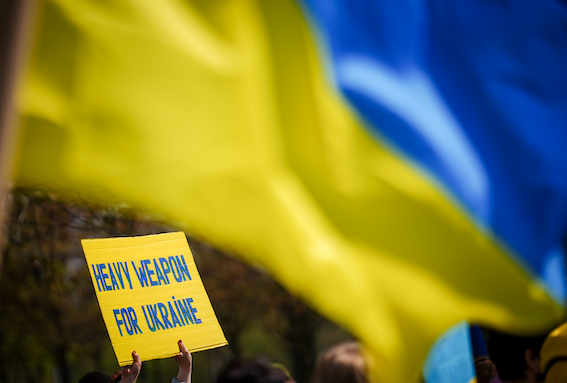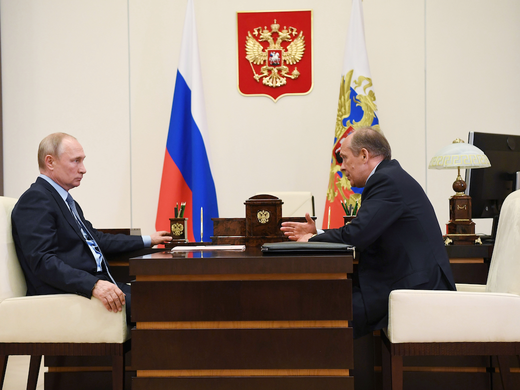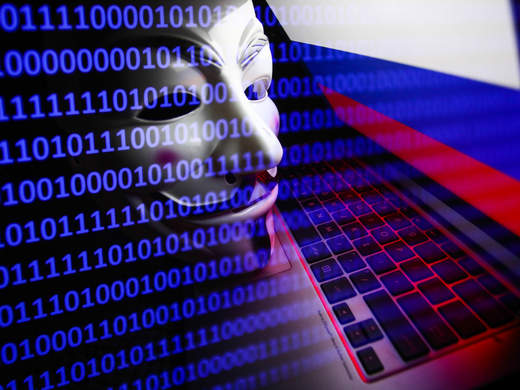It's said among America’s intelligence allies that if you want to know what the Central Intelligence Agency is thinking, wait three days and it will be in The New York Times. This snark derives from the fact America’s intelligence agencies (or individuals within them) are fierce bureaucratic fighters with a reputation for strategically leaking information when it suits their purposes — something that has often earned the ire of presidents, ranging from Barack Obama to Donald Trump.
In this sense, strategic leaking of information by intelligence communities in the West is not new. But the use of intelligence by the United States and the United Kingdom as an instrument of state power in the run-up to Russia’s invasion of Ukraine in February is widely considered unprecedented.
What makes it different now? First, intelligence studies scholar Mark Lowenthal notes, US governments have typically shared material after an event has taken place, rather than before. Here, the United States and the United Kingdom have flipped the script when it comes to both adversaries and allies. The United States made it known to Russia in November 2021 that it was aware of Putin’s plans. And the United States and United Kingdom have shared intelligence with their allies to make a similar point. While these efforts did not prevent Russia from invading Ukraine or convince skeptical partners that an invasion was imminent (notably France and Germany), they made it difficult for Russia to disguise its plans, and likely speeded the unified allied response.
Additionally, intelligence is being declassified and shared as an information operation against Russia and Vladimir Putin. While some of this “prebunking” has helped shape the information environment, it also has the effect of generating suspicion and confusion within Russia’s intelligence services, increasing the level of paranoia about leaks and moles. It is harder for agencies such as the FSB (the Federal Security Service, one of Russia’s major intelligence agencies) to focus on supporting Russian efforts in Ukraine and abroad if they are fighting internally.
As the war continues to rage, US and UK officials alike believe they have created a new model for how intelligence can support geopolitical goals in an era of revived great-power competition. While this strategy entails taking risks, it is facilitated by the existence of robust open-source information, commercially available intelligence and lessons learned from years of Russian information operations, as well as by poor Russian communication and operational security. Where declassification may be difficult, these sources may provide alternative sources that intelligence agencies can share.
What should we make of these developments? In areas such as cyber defence and information operations, an increase in declassification and the sharing of information for the purpose of defending critical infrastructure and democratic institutions is welcome. For the broader public, short online unclassified briefings provide transparency as to what intelligence agencies are focused on.
Other states seem to be taking similar steps. Just as the UK Ministry of Defence is sharing updates about the crisis, Canada’s Communications Security Establishment has begun providing declassified online briefs about Russian information operations.
However, before we can see these developments as a new model to be emulated, caution and sober analysis of the downsides are also needed. Most notably, if Putin had chosen not to engage in his military campaign in Ukraine, we would be having a very different conversation about the strategic use of intelligence for geopolitical ends. The US and UK intelligence communities continue to suffer reputational damage after the George W. Bush administration’s claims of weapons of mass destruction in Iraq (as well as numerous other more recent intelligence failures, such as the Afghanistan withdrawal).
In addition, these activities involve a clear blurring of intelligence with information operations. Of course, all information operations are based on some kind of intelligence — but in this case intelligence is the operation itself, not merely what underpins it. This approach raises the risk of accusations of politicization. Already, American authorities have noted that they are sharing information in which they do not have full confidence, calculating that the geopolitical advantage of sharing makes it worth the risk. In doing so there is a danger that an intelligence community becomes seen as cheerleader and propagandist, parroting government-approved narratives and preferred outcomes rather than providing sober analysis to governments and allies. The risk of further reputational harm cannot be overstated.
Finally, while deterrence and disruption through declassification are being heralded as twenty-first-century weapons, the war in Ukraine is very much a twentieth-century affair, with massive armies built up over time to engage in land warfare. Future events may not lend themselves to these kinds of operations. In this sense, it’s vital that intelligence agencies understand the conditions that created success before generalizing this approach to future conflicts and heralding a new era of intelligence primacy.



